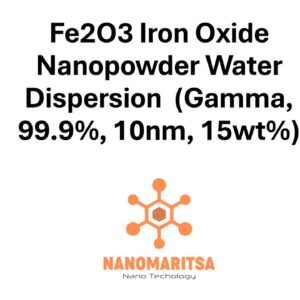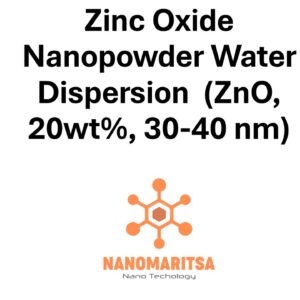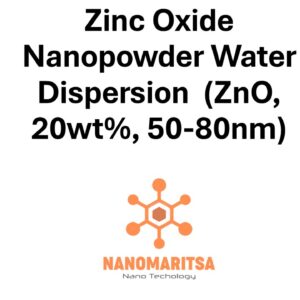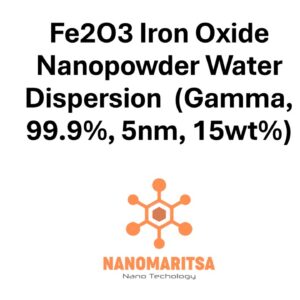Metal Oxide Dispersions
Aluminum Oxide Nanopowder Water Dispersion (Al2O3,Gamma, 20wt%, 30nm)
€50.00
CompareAluminum Oxide Nanopowder Water Dispersion (Al₂O₃, Gamma, 20 wt%, 30 nm) is a suspension of gamma-phase aluminum oxide nanoparticles in water, tailored for advanced applications requiring high surface area and reactivity. Here’s a detailed breakdown:
1. Composition:
- Aluminum Oxide (Al₂O₃):
- A widely used ceramic material with excellent thermal, chemical, and mechanical properties.
- Gamma Phase (γ):
- A metastable crystalline form of Al₂O₃ with:
- High surface area and porosity.
- Increased reactivity compared to the alpha phase.
- Commonly used in catalytic, adsorption, and coating applications.
- A metastable crystalline form of Al₂O₃ with:
- Nanoparticles (30 nm):
- Particles have an average diameter of 30 nanometers (nm).
- Nano-scale size enhances surface area and reactivity.
- 20 wt%:
- The dispersion contains 20% by weight of aluminum oxide nanoparticles; the remaining 80% is water.
- Water Dispersion:
- A uniform suspension of nanoparticles in water for easy handling and application.
2. Key Properties:
- Gamma Phase Advantages:
- High adsorptive capacity and catalytic activity.
- Thermally stable at moderate temperatures.
- Nano Size (30 nm):
- Large surface area-to-volume ratio, enhancing interaction with surrounding materials.
- Water-Based:
- Eco-friendly and easy to integrate into aqueous systems.
- Thermal Stability:
- Maintains gamma phase stability at moderate temperatures before transitioning to the alpha phase at higher temperatures (~900–1100°C).
- High Dispersion Stability:
- Nanoparticles remain evenly suspended without agglomeration when handled properly.
3. Applications:
- Catalysis:
- Used as a catalyst or catalyst support in reactions like reforming, hydrogenation, and pollutant removal.
- Adsorption:
- Ideal for gas or liquid adsorption due to its porous structure.
- Used in air purification, water treatment, and desiccation.
- Polishing:
- An abrasive agent in precision polishing of optics, semiconductors, and metals.
- Coatings:
- Forms protective or thermal barrier coatings for industrial and aerospace applications.
- Composites:
- Reinforces mechanical and thermal properties in polymers, ceramics, and metal matrices.
- Electronics:
- Functions as an insulating material in high-performance electronic devices.
- Thermal Management:
- Used in thermal interface materials and heat-resistant applications.
4. Advantages:
- High Surface Area:
- Enhances catalytic and adsorptive efficiency.
- Environmentally Friendly:
- Water-based dispersion avoids the use of harmful organic solvents.
- Ease of Use:
- Pre-dispersed for uniform application, reducing preparation time.
- Versatility:
- Suitable for a wide range of industrial, scientific, and technological applications.
5. Handling and Storage:
- Handling:
- Shake or stir the dispersion thoroughly before use to ensure uniform nanoparticle distribution.
- Use appropriate protective equipment to avoid skin or eye contact.
- Storage:
- Store in a cool, dry place to prevent freezing or excessive heat, which may destabilize the dispersion.
- Safety:
- Non-toxic when handled properly but avoid inhaling any mist or aerosolized particles.
SKU: MN07NPD0103
Category: Metal Oxide Dispersions
| Measurement (ml) | 100 ml, 500 ml, 1000 ml |
|---|
Related products
-
Metal Oxide Dispersions
Fe2O3 Iron Oxide Nanopowder Water Dispersion (Gamma, 99.9%, 10nm, 15wt%)
0 out of 5(0)SKU: MN07NPD0124€280.00 This product has multiple variants. The options may be chosen on the product page -
Metal Oxide Dispersions
Zinc Oxide Nanopowder Water Dispersion (ZnO, 20wt%, 30-40 nm)
0 out of 5(0)SKU: MN07NPD0114€70.00 This product has multiple variants. The options may be chosen on the product page -
Metal Oxide Dispersions
Zinc Oxide Nanopowder Water Dispersion (ZnO, 20wt%, 50-80nm)
0 out of 5(0)SKU: MN07NPD0113€70.00 This product has multiple variants. The options may be chosen on the product page -
Metal Oxide Dispersions
Fe2O3 Iron Oxide Nanopowder Water Dispersion (Gamma, 99.9%, 5nm, 15wt%)
0 out of 5(0)SKU: MN07NPD0123€280.00 This product has multiple variants. The options may be chosen on the product page






